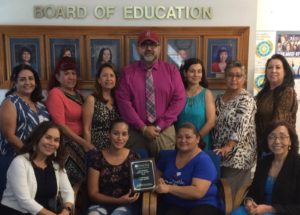El Monte, CA

Row 2 (L to R): Alicia Garcia, Josefina Ortiz, Geraldine Lorenzana, Dr. Hugo Moreno, Glenda Giron, Haydee Triay, Martha Cabrera
Developing Parent Leaders for More Successful Students
Research confirms that children do better in school if their parents are involved in their education. Mountain View School District—a K-8 district—serves a large percentage of Hispanic students and families. To enable more Hispanic parents to feel confident about guiding their children through the grades, Mountain View partnered with the California Association for Bilingual Education (CABE) to offer parent workshops—but with a twist. The parents who attended CABE training workshops were asked to share the information and strategies they learned with other parents.
Often, when parents lead workshops for other parents in English and Spanish, more and different parents attend the sessions at their own schools. Parent-led workshops also empower parent leaders to get more involved on school-based Action Teams for Partnerships (ATPs), District Advisory Councils, and other committees.
The district office gave the names of the CABE program graduates with principals who could request them to conduct workshops for parents at their schools. Each school’s community liaison worked with the parent leader to identify space at the school for the series of 12 meetings and to recruit parents who were interested in becoming leaders themselves. The district helped parent leaders obtain materials and equipment for their meetings. A ceremony of completion celebrated the accomplishments of each new group, thereby continually scaling up the number of parent leaders in the district who, in turn, could help other parents learn about their child’s school and the districts programs and services. The district will monitor whether the investment in parent leaders affected student success across the grades.
This activity is featured in Promising Partnership Practices 2018.
Family Biliteracy Program
In Mountain View School District, district leaders tested a program for parent and child pairs to read and discuss books in Spanish and English. The district trained one teacher and Community Liaison in six schools to conduct the Family Biliteracy Program. About 60 parents and 60 students participated in these after-school parent-child reading groups.
Each school invited bilingual parents and students to participate in a 16-week program to read and discuss four books—each one for 4 weeks. The students and parents read the books, discussed themes as a group, and strengthened their bilingual language skills in English and Spanish. Each meeting provided many opportunities for vocabulary development. In week 1 for each book, vocabulary words were introduced to students and parents, along with information on a family project that each parent-child pair had to complete by week 4. In weeks 2 and 3, parents and students conducted dialogic reading and questioning activities to understand and talk about the main themes of each book. In week 4, parents and students presented their projects that were based on a theme or event in each book.
The unique focus on bilingual reading, discussions, and projects helped students build reading and other English Language Arts skills that they could use in other subjects. The program also aimed to increase students’ love of reading and pride in home culture. Pre- and post-vocabulary tests revealed that a majority of students improved their English vocabulary. Most parents reported that they were able to extend the group activities that they conducted at school to support their children’s reading, speaking, and listening skills, and reading at home.

